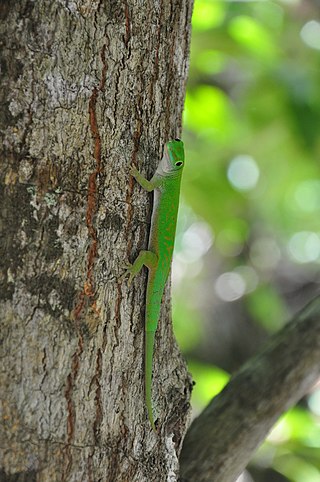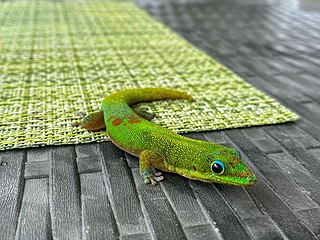
Phelsuma is a large genus of geckos in the family Gekkonidae. Species in the genus Phelsuma are commonly referred to as day geckos.

Phelsuma astriata semicarinata is a subspecies of Seychelles day gecko. It is a small, slender gecko, has a bright green colour and feeds on insects. It is found on different islands of the Seychelles, where it often lives near human dwellings.

Phelsuma comorensisBoettger, 1913 is a species of geckos that lives on the island Grande Comore and typically dwells on trees. It feeds on insects and nectar.

Phelsuma dubia, also known as dull day gecko, olive day gecko, Zanzibar day gecko or green day gecko, is a diurnal species of gecko. It is about 15 centimetres (5.9 in) in length and lives on the western coast of Madagascar, in the Comoros, and the coast of East Africa. It typically inhabits trees and can also be found near human dwellings. The Dull day gecko feeds on insects and nectar.
Agalega day gecko is a subspecies of geckos.

The yellow-throated day gecko is an endangered diurnal species of gecko from eastern Madagascar. It typically inhabits rainforests and dwells on trees. This endangered species feeds on insects and nectar.

The Mauritius lowland forest day gecko, also known commonly as the orange-spotted day gecko, is a diurnal species of gecko, a lizard in the family Gekkonidae. The species is native to the western coast of Mauritius and typically inhabits large trees. The Mauritius lowland forest day gecko feeds on insects and nectar.

The speckled day gecko is a diurnal species of geckos. It lives in eastern Madagascar and typically inhabits rainforests and dwells on trees. The speckled day gecko feeds on insects and nectar.
Phelsuma laticauda angularisMertens, 1964 is a diurnal subspecies of geckos. It lives in northern Madagascar and typically inhabits different trees and houses. The Gold dust day gecko feeds on insects and nectar.

Koch's giant day gecko is a diurnal subspecies of gecko, a lizard in the family Gekkonidae. The subspecies is native to northwestern and western Madagascar and typically inhabits trees. It feeds on insects and nectar.

The flat-tailed day gecko is a diurnal gecko lives in eastern Madagascar. It is endangered due to illegal collection for the international pet trade. It typically inhabits rainforests and dwells on trees. The flat-tailed day gecko feeds on insects and nectar.

Pasteur's day gecko is a small diurnal subspecies of gecko. It lives in the Comoros and typically inhabits trees and bushes. Pasteur's day gecko feeds on insects and nectar.

Phelsuma v-nigra v-nigraBoettger, 1913 is a small diurnal subspecies of geckos. It lives in the Comoros and typically inhabits trees and bushes. Phelsuma v-nigra v-nigra feeds on insects and nectar.

The Grand Comoro Day Gecko is a small diurnal subspecies of geckos. It lives in the Comoros and typically inhabits trees and bushes. The Grand Comoro day gecko feeds on insects and nectar.

The Anjouan Island day gecko is a small diurnal subspecies of gecko. It lives in the Comoros and typically inhabits trees and bushes. The Anjouan Island day gecko feeds on insects and nectar.

Seychelles giant day gecko is diurnal subspecies of geckos. It lives on the island Praslin in the Seychelles and typically inhabits trees and dwellings. The Seychelles giant day gecko feeds on insects and nectar.

Mahé day gecko is a diurnal subspecies of geckos. It lives on the western granite islands of the Seychelles and typically inhabits trees and human dwellings. The Seychelles giant day gecko feeds on insects and nectar.

Mauritius ornate day gecko is a diurnal species of gecko. It occurs on the island of Mauritius and some surrounding islands and typically inhabits different trees and bushes. The Mauritius ornate day gecko feeds on insects and nectar.
Phelsuma parkeri, commonly known as Parker's day gecko or the Pemba Island day gecko, is a diurnal species of lizard in the family Gekkonidae. The species is endemic to Pemba Island, Tanzania, and typically inhabits banana trees and dwellings. The Pemba Island day gecko feeds on insects and nectar.
Phelsuma pusilla pusilla is a diurnal gecko and lives in eastern Madagascar. It typically inhabits different trees and houses. This day gecko feeds on insects and nectar.
















